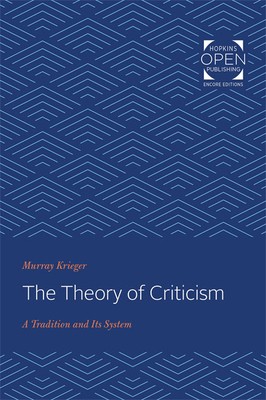
- We will send in 10–14 business days.
- Author: Murray Krieger
- Publisher: Johns Hopkins University Press
- ISBN-10: 1421431262
- ISBN-13: 9781421431260
- Format: 15.2 x 22.9 x 1.6 cm, minkšti viršeliai
- Language: English
- SAVE -10% with code: EXTRA
Reviews
Description
Originally published in 1976. Representing years of critical reflection, The Theory of Criticism attempts to construct a poetics of "presence." Within a wide range of critical terminology, Murray Krieger has sought to create a new vision. In language that is passionate and often dramatic, he looks at the multidimensionality of the poetic world through the lens of Western poetics. His work clearly addresses itself to post-New Critical questions: how to preserve the literary object as a thing to be perceived, valued, and enjoyed and yet to account for its presence in, and interaction with, our culture as a whole, always in danger of being dissolved into man's language-making and -forming activity in general. Our awareness of the poem as object must be modified by our awareness that it is an "intentional" object. Krieger develops his balanced vision in three parts.
Part 1 defines the problem and defends the very activity of theorizing both in its own terms and in terms of the critic's function throughout the history of Western criticism. By asking at the outset whether criticism is vain or valuable, Krieger already confronts the basic tension between system and world and the need to account for both. By creating a heuristic system that examines the possibility of form, the critic serves also the world of history and thought as a whole. Part 2 pursues that history from the classical encounter with mimesis in Greek thought to the Romantic and post-Romantic elevation of consciousness as a main criterion of poetic art. Defining a "humanistic aesthetic" as it has been viewed since Aristotle, the author shows how, during and after the eighteenth century, form was opened up under the impact of a Kantian and post-Kantian view, epitomized finally by Coleridge's imagination and its consequences for recent theorists. Part 3 deals with the image of the world struggling against its enclosure within a poetic context. It expands our view of metaphor as a reflection of the dual nature of poetic language, simultaneously locked into the poem and referring to history and nature outside. Our reading of the poem, Krieger concludes, must be double: we must see the poem as a linear and chronological sequence reflecting real life, and we must read it as a circular, imitative, mutually implicative mode.
EXTRA 10 % discount with code: EXTRA
The promotion ends in 23d.05:49:01
The discount code is valid when purchasing from 10 €. Discounts do not stack.
- Author: Murray Krieger
- Publisher: Johns Hopkins University Press
- ISBN-10: 1421431262
- ISBN-13: 9781421431260
- Format: 15.2 x 22.9 x 1.6 cm, minkšti viršeliai
- Language: English English
Originally published in 1976. Representing years of critical reflection, The Theory of Criticism attempts to construct a poetics of "presence." Within a wide range of critical terminology, Murray Krieger has sought to create a new vision. In language that is passionate and often dramatic, he looks at the multidimensionality of the poetic world through the lens of Western poetics. His work clearly addresses itself to post-New Critical questions: how to preserve the literary object as a thing to be perceived, valued, and enjoyed and yet to account for its presence in, and interaction with, our culture as a whole, always in danger of being dissolved into man's language-making and -forming activity in general. Our awareness of the poem as object must be modified by our awareness that it is an "intentional" object. Krieger develops his balanced vision in three parts.
Part 1 defines the problem and defends the very activity of theorizing both in its own terms and in terms of the critic's function throughout the history of Western criticism. By asking at the outset whether criticism is vain or valuable, Krieger already confronts the basic tension between system and world and the need to account for both. By creating a heuristic system that examines the possibility of form, the critic serves also the world of history and thought as a whole. Part 2 pursues that history from the classical encounter with mimesis in Greek thought to the Romantic and post-Romantic elevation of consciousness as a main criterion of poetic art. Defining a "humanistic aesthetic" as it has been viewed since Aristotle, the author shows how, during and after the eighteenth century, form was opened up under the impact of a Kantian and post-Kantian view, epitomized finally by Coleridge's imagination and its consequences for recent theorists. Part 3 deals with the image of the world struggling against its enclosure within a poetic context. It expands our view of metaphor as a reflection of the dual nature of poetic language, simultaneously locked into the poem and referring to history and nature outside. Our reading of the poem, Krieger concludes, must be double: we must see the poem as a linear and chronological sequence reflecting real life, and we must read it as a circular, imitative, mutually implicative mode.


Reviews